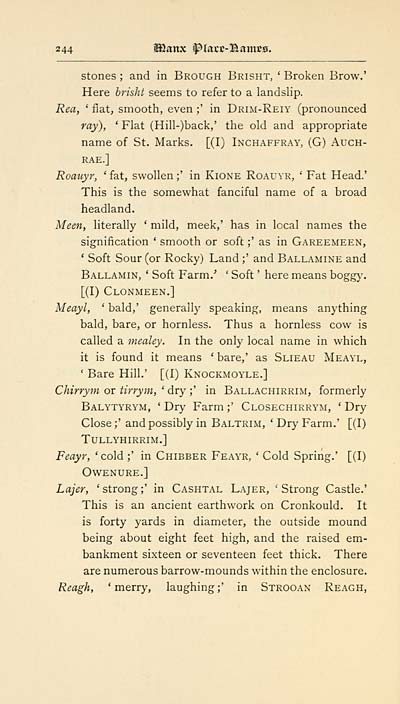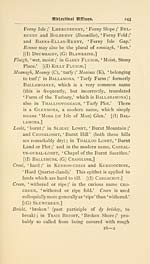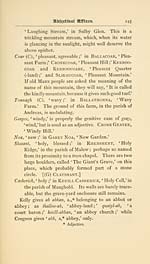Download files
Complete book:
Individual page:
Thumbnail gallery: Grid view | List view

244 Manx ^IacE-BantB0.
stones ; and in Brough Brisht, ' Broken Brow.'
Here brisht seems to refer to a landslip.
Rea, ' fiat, smooth, even ;' in Drim-Reiy (pronounced
ray), ' Flat (Hill-)back,' the old and appropriate
name of St. Marks. [(I) Inchaffray, (G) Auch-
RAE.]
Roauyr, ' fat, swollen ;' in Kione Roauyr, ' Fat Head.'
This is the somewhat fanciful name of a broad
headland.
Meen, literally ' mild, meek,' has in local names the
signification * smooth or soft ;' as in Gareemeen,
' Soft Sour (or Rocky) Land ;' and Ballamine and
Ballamin, * Soft Farm.-* ' Soft ' here means bogg}'.
[(I) Clonmeen.]
Meayl, ' bald,' generally speaking, means anything
bald, bare, or hornless. Thus a hornless cow is
called a mealey. In the only local name in which
it is found it means ' bare,' as Slieau Meayl,
' Bare Hill.' [(1) Knockmoyle.]
Chirrym or tirrym, ' dry ;' in Ballachirrim, formerly
Balytyrym, ' Dry Farm ;' Closechirrym, ' Dry
Close ;' and possibly in Baltrim, ' Dry Farm.' [(I)
Tullyhirrim.]
Feayr, 'cold ;' in Chibber Feayr, ' Cold Spring.' [(I)
Owenure.]
Lajer, ' strong ;' in Cashtal Lajer, ' Strong Castle.'
This is an ancient earthwork on Cronkould. It
is forty yards in diameter, the outside mound
being about eight feet high, and the raised em-
bankment sixteen or seventeen feet thick. There
are numerous barrow-mounds within the enclosure.
Reagh, 'merry, laughing;' in Strooan Reach,
stones ; and in Brough Brisht, ' Broken Brow.'
Here brisht seems to refer to a landslip.
Rea, ' fiat, smooth, even ;' in Drim-Reiy (pronounced
ray), ' Flat (Hill-)back,' the old and appropriate
name of St. Marks. [(I) Inchaffray, (G) Auch-
RAE.]
Roauyr, ' fat, swollen ;' in Kione Roauyr, ' Fat Head.'
This is the somewhat fanciful name of a broad
headland.
Meen, literally ' mild, meek,' has in local names the
signification * smooth or soft ;' as in Gareemeen,
' Soft Sour (or Rocky) Land ;' and Ballamine and
Ballamin, * Soft Farm.-* ' Soft ' here means bogg}'.
[(I) Clonmeen.]
Meayl, ' bald,' generally speaking, means anything
bald, bare, or hornless. Thus a hornless cow is
called a mealey. In the only local name in which
it is found it means ' bare,' as Slieau Meayl,
' Bare Hill.' [(1) Knockmoyle.]
Chirrym or tirrym, ' dry ;' in Ballachirrim, formerly
Balytyrym, ' Dry Farm ;' Closechirrym, ' Dry
Close ;' and possibly in Baltrim, ' Dry Farm.' [(I)
Tullyhirrim.]
Feayr, 'cold ;' in Chibber Feayr, ' Cold Spring.' [(I)
Owenure.]
Lajer, ' strong ;' in Cashtal Lajer, ' Strong Castle.'
This is an ancient earthwork on Cronkould. It
is forty yards in diameter, the outside mound
being about eight feet high, and the raised em-
bankment sixteen or seventeen feet thick. There
are numerous barrow-mounds within the enclosure.
Reagh, 'merry, laughing;' in Strooan Reach,
Set display mode to: Large image | Transcription
Images and transcriptions on this page, including medium image downloads, may be used under the Creative Commons Attribution 4.0 International Licence unless otherwise stated. ![]()
| Early Gaelic Book Collections > Blair Collection > Surnames & place-names of the Isle of Man > (262) |
|---|
| Permanent URL | https://digital.nls.uk/82102792 |
|---|
| Description | A selection of books from a collection of more than 500 titles, mostly on religious and literary topics. Also includes some material dealing with other Celtic languages and societies. Collection created towards the end of the 19th century by Lady Evelyn Stewart Murray. |
|---|
| Description | Selected items from five 'Special and Named Printed Collections'. Includes books in Gaelic and other Celtic languages, works about the Gaels, their languages, literature, culture and history. |
|---|

